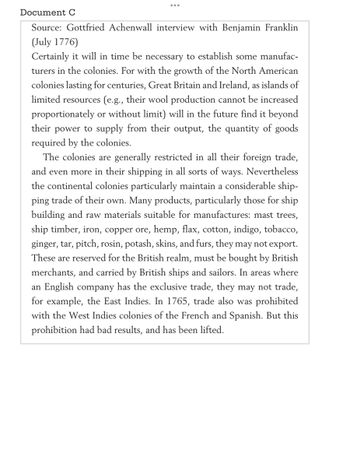Question
Explain

Transcribed Image Text:Document C
Source: Gottfried Achenwall interview with Benjamin Franklin
(July 1776)
Certainly it will in time be necessary to establish some manufac-
turers in the colonies. For with the growth of the North American
colonies lasting for centuries, Great Britain and Ireland, as islands of
limited resources (e.g., their wool production cannot be increased
proportionately or without limit) will in the future find it beyond
their power to supply from their output, the quantity of goods
required by the colonies.
The colonies are generally restricted in all their foreign trade,
and even more in their shipping in all sorts of ways. Nevertheless
the continental colonies particularly maintain a considerable ship-
ping trade of their own. Many products, particularly those for ship
building and raw materials suitable for manufactures: mast trees,
ship timber, iron, copper ore, hemp, flax, cotton, indigo, tobacco,
ginger, tar, pitch, rosin, potash, skins, and furs, they may not export.
These are reserved for the British realm, must be bought by British
merchants, and carried by British ships and sailors. In areas where
an English company has the exclusive trade, they may not trade,
for example, the East Indies. In 1765, trade also was prohibited
with the West Indies colonies of the French and Spanish. But this
prohibition had bad results, and has been lifted.
Expert Solution
This question has been solved!
Explore an expertly crafted, step-by-step solution for a thorough understanding of key concepts.
This is a popular solution
Trending nowThis is a popular solution!
Step by stepSolved in 2 steps
